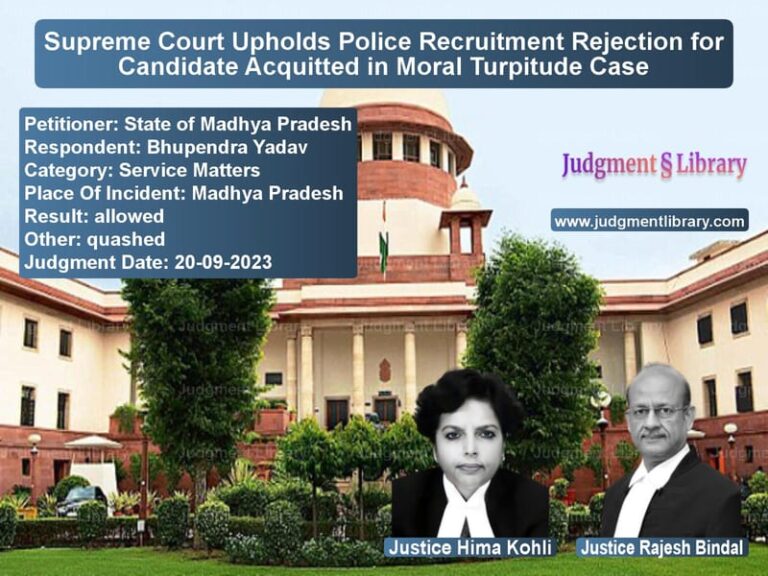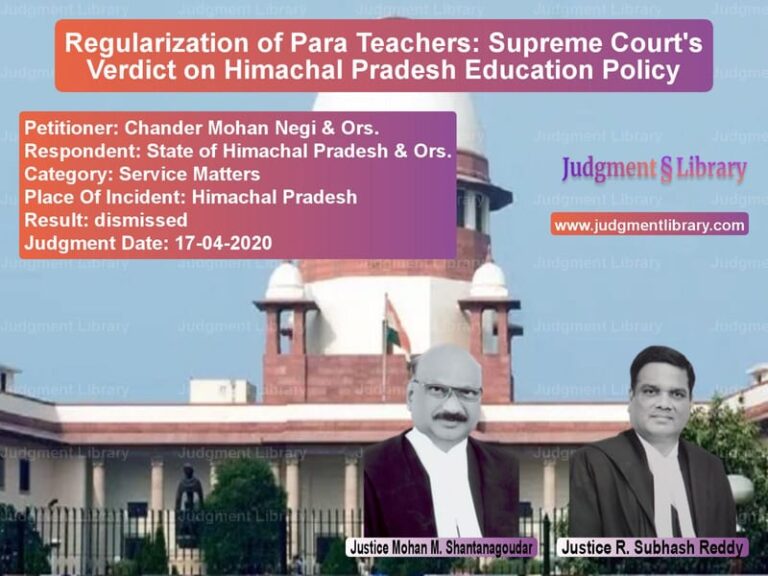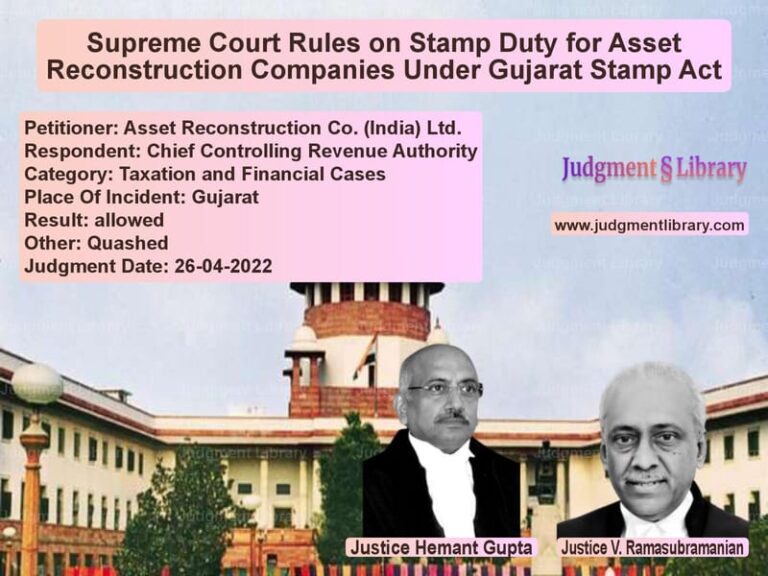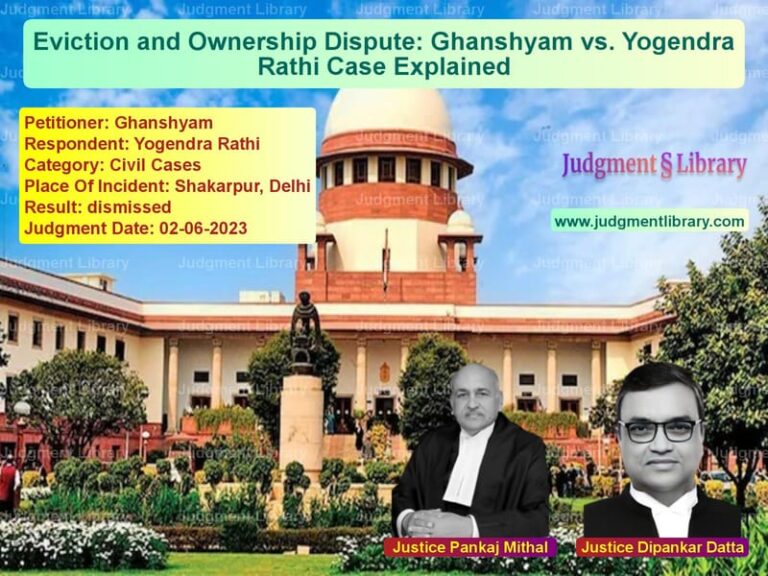Supreme Court Modifies Sentence in Bigamy Case, Orders Sequential Jail Terms
The Supreme Court of India, in its judgment dated July 15, 2024, modified the sentence imposed on M. Revathi and Baba Natarajan Prasad for committing the offense of bigamy under Section 494 of the Indian Penal Code (IPC). While upholding their conviction, the Court reduced their prison terms to six months of simple imprisonment instead of the original one-year term. The Court also devised a unique arrangement for the convicts to serve their sentences separately, considering the welfare of their minor child.
Background of the Case
The appellant, Baba Natarajan Prasad, filed a private complaint under Section 200 of the Code of Criminal Procedure, 1973 (CrPC), against his wife M. Revathi (Accused No. 1) and her second husband Baba Natarajan Prasad (Accused No. 2) for contracting a bigamous marriage while their earlier marriage was legally subsisting. The complainant sought strict punishment, arguing that the offense had caused him emotional distress and social stigma.
Legal Proceedings and Initial Conviction
The Trial Court, after evaluating the evidence, convicted both accused under Section 494 IPC and sentenced them to one year of rigorous imprisonment along with a fine of Rs. 2,000 each. In default of payment, they were to undergo three months of simple imprisonment. The parents of Accused No. 1, who were accused of aiding the second marriage, were acquitted.
The convicts appealed to the Additional District and Sessions Court, which overturned the trial court’s judgment and acquitted them. However, upon further appeal by the complainant, the Madras High Court reversed the acquittal and restored the conviction but drastically reduced the sentence to “imprisonment till the rising of the court” with a fine of Rs. 20,000 each.
Appeal Before the Supreme Court
The complainant challenged the High Court’s lenient sentencing before the Supreme Court, arguing that bigamy is a serious offense that warrants stricter punishment.
Arguments by the Appellant
The appellant, represented by Senior Advocate R. Basanth, contended that:
- The High Court had been excessively lenient in sentencing the accused.
- Bigamy is a serious offense that should not be trivialized with a mere fine and nominal imprisonment.
- The accused had continued to live as a married couple, had a child together, and had caused irreparable harm to the appellant.
- The trial court’s original sentence of one year rigorous imprisonment should be restored.
Arguments by the Respondents
The respondents, represented by Advocate Ratnakar Das, countered that:
- The conviction was not challenged, and they had already accepted the punishment imposed by the High Court.
- The child born from the second marriage was only six years old and required both parents’ care.
- Since the marriage between the complainant and Accused No. 1 was already dissolved, further imprisonment would serve no real purpose.
Supreme Court’s Observations
1. Seriousness of Bigamy as an Offense
The Court reiterated that bigamy is a serious offense under Section 494 IPC, emphasizing:
“Where the offense of bigamy is proved, the court could not take a lenient view. The offense undermines the sanctity of marriage and causes emotional and financial hardship to the victim.”
2. High Court’s Leniency Was Unjustified
The Court criticized the High Court for imposing an inadequate punishment:
“Imposing only ‘imprisonment till the rising of the court’ trivializes the offense and fails to act as a deterrent.”
3. Modified Sentence with Consideration for Child
Balancing justice with humanitarian concerns, the Court reduced the sentence from one year to six months of simple imprisonment. To ensure the child was not deprived of both parents at the same time, the Court directed:
- Accused No. 2 (husband) shall surrender and serve his six-month sentence first.
- Upon his release, Accused No. 1 (wife) shall surrender and serve her six-month sentence.
- If they fail to surrender, the trial court shall take appropriate legal steps to enforce the sentence.
Final Judgment
- The Supreme Court partially allowed the appeal, modifying the sentence to six months of simple imprisonment each.
- The fine was reduced from Rs. 20,000 each to Rs. 2,000 each.
- The accused must surrender within three weeks to serve their sentences sequentially.
- The trial court was directed to monitor compliance.
Key Takeaways
- Bigamy is a punishable offense: The ruling reaffirms that courts will not take bigamy lightly and will impose meaningful sentences.
- Proportional sentencing is essential: The Court upheld the principle that punishment must match the severity of the crime.
- Child welfare considerations: The sequential sentencing arrangement ensures that the minor child is not left without parental care.
- Judicial oversight in enforcing sentences: The Court ensured that non-compliance would result in enforcement by the trial court.
Conclusion
The Supreme Court’s judgment establishes a crucial precedent for handling bigamy cases. By striking a balance between the need for punitive measures and humanitarian concerns, the ruling ensures that justice is served while also safeguarding the interests of innocent dependents.
Petitioner Name: Baba Natarajan Prasad.Respondent Name: M. Revathi.Judgment By: Justice C.T. Ravikumar, Justice Sanjay Kumar.Place Of Incident: Coimbatore, Tamil Nadu.Judgment Date: 14-07-2024.
Don’t miss out on the full details! Download the complete judgment in PDF format below and gain valuable insights instantly!
Download Judgment: baba-natarajan-prasa-vs-m.-revathi-supreme-court-of-india-judgment-dated-14-07-2024.pdf
Directly Download Judgment: Directly download this Judgment
See all petitions in Criminal Defamation
See all petitions in Fraud and Forgery
See all petitions in Judgment by C.T. Ravikumar
See all petitions in Judgment by Sanjay Kumar
See all petitions in partially allowed
See all petitions in Modified
See all petitions in supreme court of India judgments July 2024
See all petitions in 2024 judgments
See all posts in Criminal Cases Category
See all allowed petitions in Criminal Cases Category
See all Dismissed petitions in Criminal Cases Category
See all partially allowed petitions in Criminal Cases Category







